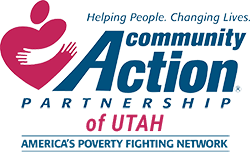Virtual Conference Opening Session
Conference opening session with state and national partners, including: Sisifo Taatiti – Utah Department of Workforce Services – State Community Services Office (Housing and Community Development Division); Denise Harlow – National Community Action Partnership; Dr. Lanique Howard – Office of Community Services, Administration for Children and Families, US Department of Health and Human Services
Keynote - Conversation with Dr. Gail Christopher
Join Dr. Gail Christopher in a discussion on what role Community Action Agencies and staff can do to address inequality. Some additional resources to accompany this award are: The HOPE Initiative website is: https://www.hopeinitiative.org/ Truth, Racial Healing & Transformation (TRHT) Campus Centers - https://www.aacu.org/trht-campus-centers NCHE website: https://www.nationalcollaborative.org/
50 Things You Need to Know to Be an Effective Advocate
For every legislative action, there is a reaction. Learn what works and what doesn't! Get an inside lesson on how to be an effective advocate from David Bradley with the National Community Action Foundation (NCAF).
Formerly Homeless Board Discussion
Hear from 3 formerly homeless individuals and families. Learn about their experiences and what parts of the homeless system they think helped them most. Ask questions about how case managers and homeless services provides could do better.
Using Data for Equity
Want to better understand equity and inequity in your communities? Want to learn more about the data you have and how to use it? Then come join us to talk about CSBG Annual Report data analysis and considerations of populations in that analysis. This session is presented by Katy Kujawski from National Association for State Community Services Programs (NASCSP) and Barbara Mooney from National Association of Certified ROMA Trainers.
Utah Courts MyCase Demo - Tools for Clients to Have Better Access to Justice
The Utah State Courts have released new tools to help individuals: * View case history (a record of what has happened in cases) * View the papers that have been filed in your case * View a list of scheduled hearings (including past and upcoming hearings) * Make payments File documents in your existing Debt Collection, Eviction, and * Small Claims case Come see a demo on the new system and how these tools can improve access to justice for customers. Additional information may be found at MyCase - Utah Courts (utcourts.gov).
Volunteer Income Tax Assistance (VITA) Program - The Power of Free Tax Preparation video
2021 marks the 52 anniversary of the Volunteer Income Tax Assistance (VITA) Program. Learn about the benefits by helping those in your community with the VITA and the Tax Counseling for the Elderly (TCE) Programs, how they were started and where you can learn more about these programs. This session was presented by Leland Smith from the IRS.
Weatherization - Consolidated Appropriations Act of 21 Update
Within the the Consolidated Appropriations Act of 2021 passed in December 2020, weatherization was reauthorized. Jonathan Ballew and Ian Gray from the National Association for State and Community Services Programs (NASCSP) will address:
- Updates on the WAP impacts of the Consolidated Appropriations Act of 2021
- NASCSP advocacy work Changes to the WAP resulting from the new legislation
- SERC and Enhancement and Innovation funding opportunities.
Organizational Standards a Tool for more Resilient Agencies
The CSBG Organizational Standards help to ensure that all Community Action Agencies have appropriate organizational capacity, in critical financial and administrative areas, as well as areas of unique importance to the overall mission of Community Action. These assessment of these standards can be used as a beneficial process to benchmark an agency’s progress and strengths, identify T/TA, and build organizational capacity. Join this session to learn more about using the CSBG Organizational Standards as a tool to gain resilience as an agency. This session will be presented by Aaron Wicks from the National Community Action Partnership.
Whole Family Approach Concepts
This session will provide an overview of whole family approach including key hallmarks for advancing social and economic mobility for children and the adults in their lives together. Additionally, the presentation will highlight resources to support implementation of this important innovation. This session will be presented by Lillie Seels from the National Community Action Partnership.
Fair Redistricting
The workshop on Creating Fair Districts will review: (a) The types of gerrymandering, e.g. cracking, packing. (b) The Voting Rights Act and Supreme Court decisions shaping the playing field (e.g. Evenwel, Rucho, et. al.). (c) Efforts in some states to do redistricting based not on total population, but instead based on the numbers of citizen, or citizens of voting age population (CVAP). (d) Actions that will reduce gerrymandering. (e) The national advocates, such as the League of Women Voters, Common Cause, Southern Poverty Law Center, former California Governor Arnold Schwarzenegger and others. (f) the schedule in your state. (g) discussion about how to proceed.
Managing Data Equity Risk and Rewards
The term “data equity” refers to using an equity lens when considering how data is collected, analyzed, interpreted, and distributed. This workshop explores the risks of failing to use an equity lens and examples of data collection practices that fall short. Attend this conference session to learn how to minimize the risks and maximize the rewards of using an equity lens to collect and use data in your Community Action Agency. This session was presented by Melanie Lockwood Herman from the Nonprofit Risk Management Center.
Assertive Case Management
Assertive Engagement is an approach to be used when engagement attempts are heading nowhere fast (if at all), and there is a need to change in order to reduce or resolve harm but inaction on the part of the program participant. The course examines how to more effectively engage people in a pre-contemplative or contemplative stage, and program participants that put up excuses or avoid their worker if change is discussed. Assertive engagement skills are necessary for effective street outreach services and effective shelter services.
